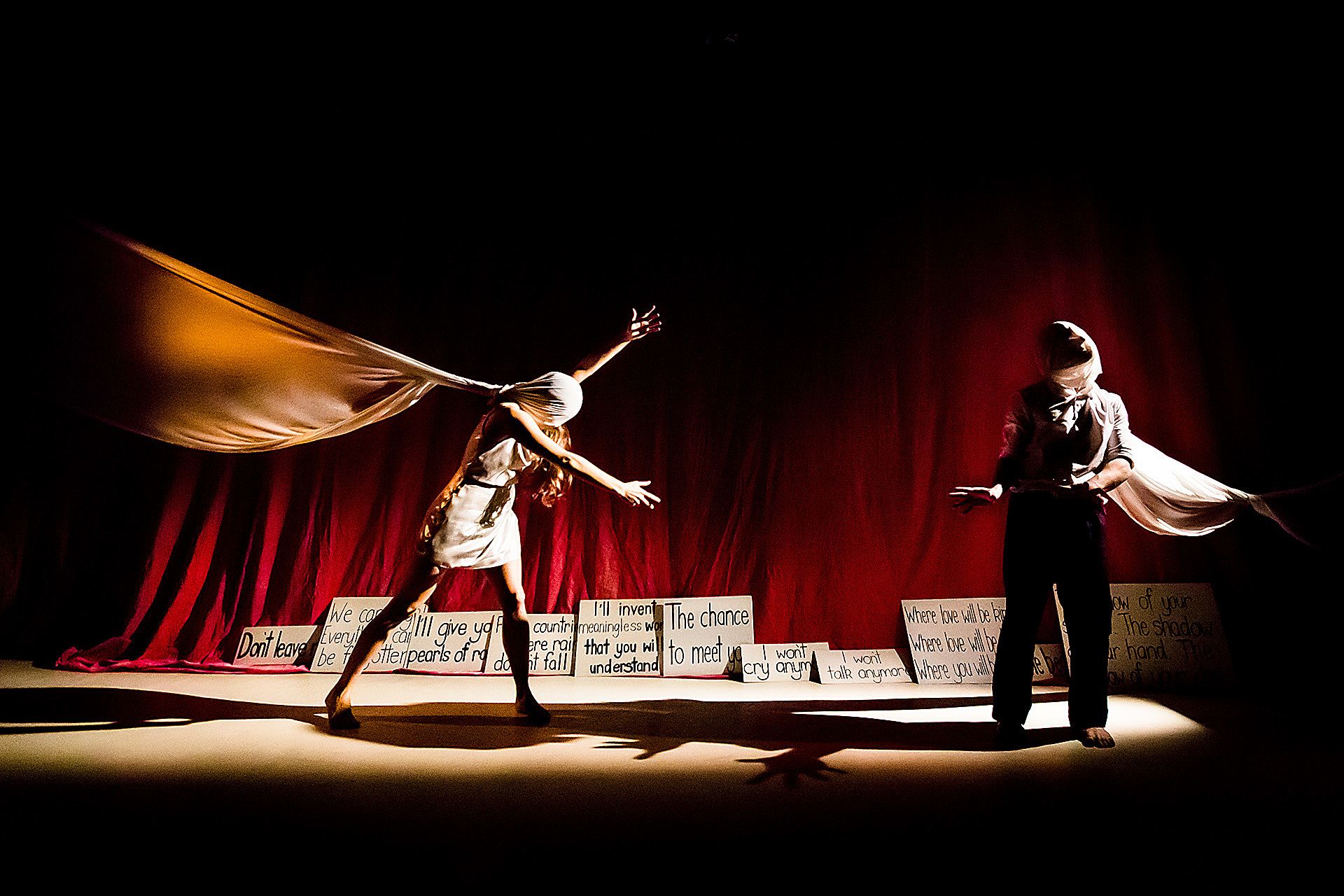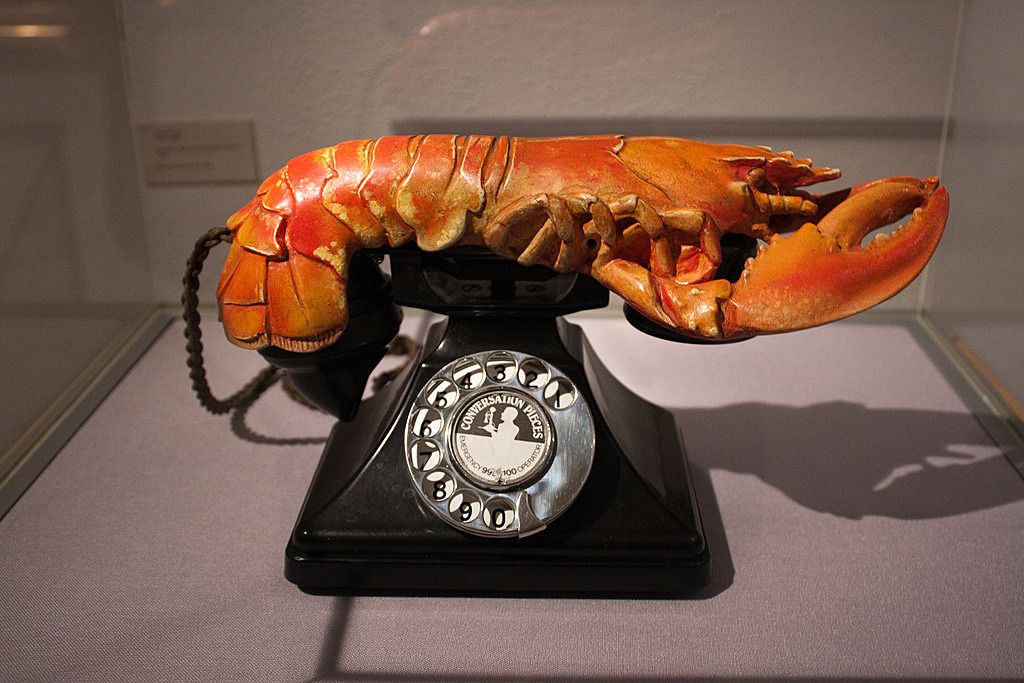Le Téléphone Aphrodisiaque: A Review of Lobsters
Adam Goodall reviews Lucy Marinkovich's dance/theatre/cabaret mash-up Lobsters, a thrilling exploration of identity, love and a lobster telephone that Dalí made one time.
Adam Goodall reviews Lucy Marinkovich's dance/theatre/cabaret mash-up Lobsters, a thrilling exploration of identity, love and a lobster telephone that Dalí made one time.
Lobsters opens with a near-nude man pupating inside a flesh-coloured lycra ball. He contorts and cracks his shoulders as he emerges from his cocoon, blossoming into a Jazz Age butterfly wearing flared pinstripe pants and a crisp white shirt. It’s a quiet, understated opening to Lobsters, Lucy Marinkovich’s grand homage to, and reclamation of, Surrealism. Against a harshly-lit Black Lodge space lined with a shiny red velvet curtain, ascendant dancer and choreographer Marinkovich takes a ton of familiar iconography – genre tropes from cinema and dance, gestures of love and despair, even a couple baking a lovely cake – and views it through a new, warped lens. The view we get is sad, funny and melancholic: a tale of love found and taken for granted, and of identity lost and taken back.
Marinkovich, who pulls duty as choreographer, designer, director and dancer on Lobsters, and her co-director and writer Miranda Manasiadis focus on the lobster that served as the ‘muse’ for one of Salvador Dalí’s seminal works, Lobster Telephone. The lobster, given the name ‘Mimi’ by Marinkovich and Manasiadis (and collaborator Lucien Johnson), was selected, mutilated and abandoned by Dalí at the 1938 International Exhibition of Surrealism, left to rot on top of a phone as audiences marvelled at how repellent and how playful it all was. Lobsters tells Mimi’s story using a melange of conventions drawn from theatre, dance and cabaret.
Manasiadis and Johnson give Mimi her voice. She casts the lobster as a tragic romantic who talks about her infatuation with Dalí – and his with her – as both a cherished memory and a warning for all who follow. Carmel McGlone gives Mimi life, though, and the life she gives her is bigger, broader. Shimmering in a bejewelled red gown, McGlone plays a vamp three wines deep. Her flirting is loose and boozy, she pushes rueful memories out from her diaphragm, and in one late, seismic scene, she belts out “Ne Me Quitte Pas”, like a fire raging in the night. I’m not totally into McGlone’s performance – it wavers, too broad and shallow and disconnected from the pain of her exploitation at Dalí’s hands too often to definitively land – but there’s a thrilling spark burning away at the centre.
It’s an accessible kind of uncanny, like something inhuman is trying to express the core of humanity as they’ve observed it.
The rest of the story, the majority of the show’s sixty-five minutes, is told by Marinkovich and her dance partners, Emmanuel Reynaud and Matthew Moore. They’re jagged, angular performers, sometimes tortured and sometimes delightfully deadpan. The forms they create, the movements they make, disrupt their silhouettes and cast their bodies in strange light. They twist from recognisably human shapes into stiff, scared birds hiding their necks from the sky or into fish on the pier, rigid as they flop and gasp for air. It’s an accessible kind of uncanny, like something inhuman is trying to express the core of humanity as they’ve observed it. Even a superficially chintzy dancehall number, McGlone and the three dancers partnering with mannequin hands, is hilarious and off-kilter as all four performers build, or drop, a different facade – Marinkovich leans into the performance of attraction (Dalí’s aphrodisiaque) but Moore disconnects, a normie trying to wrap his head around the whole thing. Lucien Johnson’s delirious compositions work beautifully with the dancers, too. It often feels like Johnson, a charming figure looming on the edge of the stage, is conjuring the dancers’ movement, whether it's in sync with his theremin or his tenor sax.
Lobsters is a thrilling piece of homage to the full lineage of the surrealist movement, but what elevates it is its embrace and reframing of the core ideas that drove the early surrealists, Dalí and his contemporaries, and that drive successors like Deren, Lynch, Maddin and Carax. Lobsters is about subjectivity and liberation, about taking the normal and shining a strange light on it, about provoking us to confront the things that we repress. The history of popular surrealism, though, means that we’ve often been asked to read that subjectivity through a male lens. That’s certainly true of Dalí’s prankish take on sexuality and eroticism, embodied by Lobster Telephone (Dalí delighted in how the lobster’s genitalia was in the same place as phone’s mouthpiece).
Marinkovich and McGlone duke past that and reclaim the subjectivity of their stories as their subjectivity. Marinkovich attempts to rebuild Dalí’s face on McGlone’s using cake mix and licorice; she destroys a pavlova next to Reynaud who then smushes his face into the debris, subverting the classic music hall gag of a pie to the face; and Marinkovich leads the movement in the final, ferocious dances, refusing to let the men lead her emotional and physical being. Lobsters is a bold and often-exhilarating piece of dance; a deeply humane, life-giving piece of storytelling; and a bracing challenge to the idea that the masculine is neutral, a stand-in for everyone.
Lobsters runs from 21 October to 4 November at Circa Theatre.
Tickets available here.



